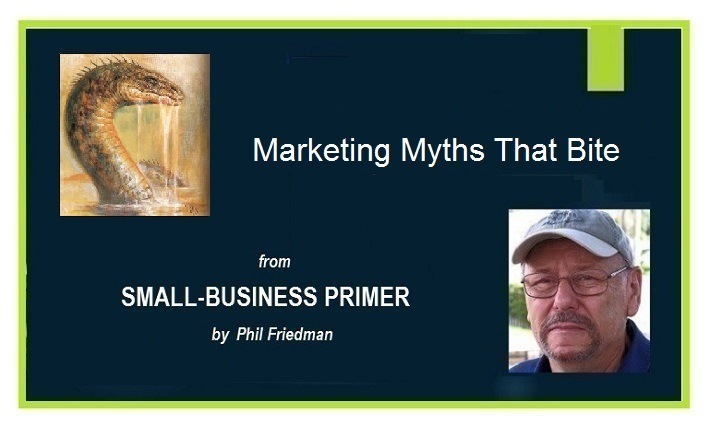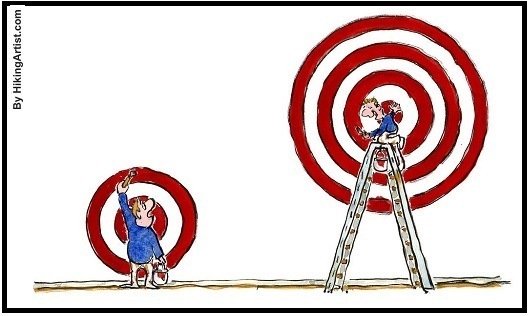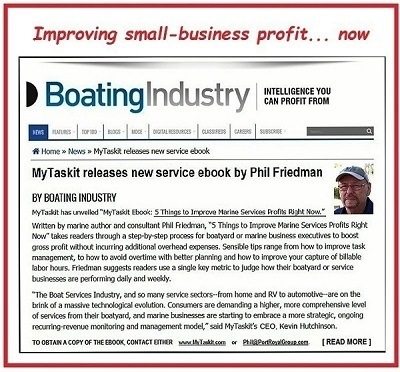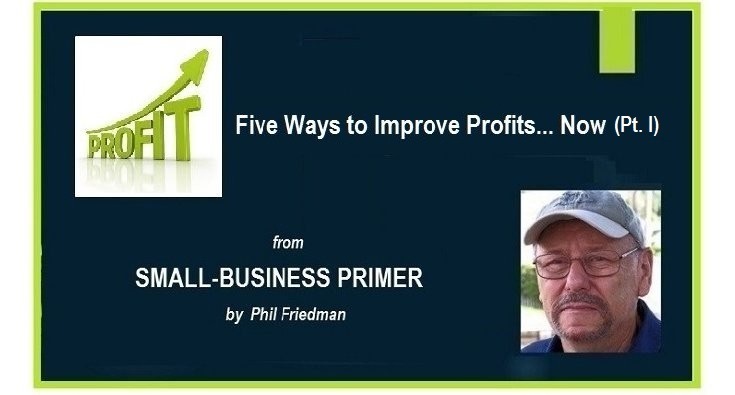Avoid Marketing Myths That Bite

SMALL BUSINESSES CAN'T AFFORD TO BLINDLY ACCEPT MYTHS ABOUT MARKETING...
Big businesses can often, if not always survive marketing mistakes. We've seen, for example, CocaCola and Netflix do it. However, big businesses can do it because, in large measure, they have sales revenues and frequently strong working capital to carry them across the Canyon of Broken Companies, without falling into the abyss.
However, most small businesses walk a much thinner tightrope and, indeed, are frequently just one deep sales valley away from finding themselves added to the docket in bankruptcy court.
Consequently, small-business people need to be especially vigilant not to fall prey to marketing myths that can really bite them in the ass...

One such myth is that providing a "first-rate customer experience" is what their primary focus should be...
Wrong! Although commonly embraced these days, this advice is widely misunderstood and, for the most part, ineptly applied as a guide to small-business management.
The "customer experience" is like the garnish on a good hamburger; it ultimately makes the eating either spectacular or just so-so. But it is not the primary part of the sandwich since, without the meat patty, you don't have much of a sandwich at all.
The "primary" or core focus of a small business needs to be delivering the goods or services promised to the customer or client, and doing so in a timely manner and at a level of quality commensurate with or exceeding that which was promised and paid for. In the absence of this, all else amounts to no more than a walkway built of smoke.
It does little for customer satisfaction or loyalty — and even less for brand-building — if you provide great telephone engagement during the sale, online ordering and delivery tracking, a follow-up customer experience survey, a coupon for a free Starbucks Grande Donde (or whatever), and a personalized birthday greeting every year — if the WackyWidget you sold the customer is a piece of crap that doesn't work even the first time the customer tries to use it. Or if it's flimsy or stops working within a week of delivery.
All the complimentary lunches, flower bouquets, emailed jokes, soothing telephone conversations (during which you refer by name to the client's spouse and children as supplied by your CRM software), won't matter to your client, if the work you promised is late, or the analysis and conclusions shoddy, or the list of deliverables uncompleted.
Big business people can sometimes get away with glossing over this fundamental truth (at least for a little while), but small-business people ignore it at their peril.

Another myth with alligator teeth is that it is preferable in marketing a small business to "under-promise and over-deliver"...
While this is common wisdom for an employee negotiating the parameters of a project with his or her boss, it is a formula for disaster when applied to small-business marketing.
This myth arises from the wrong-headed belief that if you minimize what you promise the customer or the client, and then deliver more than promised, the customer or client will be overjoyed at getting more than expected.
Which just might be true — for a few days or a week, until the customer or client realizes how much less he or she received from you and your small-business than what others are getting from some of your competitors.
Not to mention that, by adopting this strategy, a small business is most likely chasing sales away to the competition, which has the brains to promise as much or more value... and then, of course, deliver as promised.
If a small business can't deliver equal or more value than its competition in the marketplace, that is a problem which cannot be solved by scaling down its commitments to customers and clients. Rather, it is a fundamental management issue, not a "marketing" problem at all.

And yet another myth that can chew up a small business is that social media and social networking have upended and rendered obsolete the traditional principles of marketing...
It's often said — and with dogmatic fervor — that the need to cater to the largest current market, the Millennial Generation, has changed all the rules of marketing.
That seems to me a proposition propagated by millennial marketers who want you to believe that only they understand marketing because only they understand their peers and contemporaries.
It is also a position pushed by many digital marketers because they want to convince small-business people that social marketing is the only path to success these days — a proposition which they support by pointing to the alleged habits of millennials and other generations of still younger people.
But although millennials may, at this time, make up the largest single population group on the planet, it does not follow that they represent the strongest buying group. Not in general. And not in particular.
Not in general, because the strength of a market sector needs, in most cases, to be measured in terms of discretionary buying power, not in terms of population numbers.
And not in particular, because millennials, as a group, do not exhibit a uniform economic profile or demographic.
The means of marketing (the medium or media) may have changed with the emergence of our contemporary digital environment, but the traditional principles of marketing still hold across generations...
You still need to identify your target market and create a marketing campaign that will tickle the fancy of that market. For example, if you're marketing expensive, upscale product(s) and service(s), you need to find and reach people with the money to buy them, not some group arbitrarily delineated by date of birth.
You still need to convey perceived value and benefits. And you still need to build credibility and confidence in the product and the brand, in order to be able to convert prospects to customers and clients.
None of which changes depending on whether you're dealing with Millenials or Matures or Baby Boomers or Gen-Xers or Gen-Yers.
If you show me a small business that targets Millennials to the exclusion of all other potential markets, and independent of any and all consideration of the nature of the product or service being marketed, I will show you a small business that is headed for the abyss.
It's often said that running a small business is like standing knee-deep in alligators.And there is some truth in that. Therefore, it's a good idea to avoid marketing myths that also bite.
— Phil Friedman
Postscript: This is an excerpt from my upcoming eBook, Small-Business Primer: Real -World Tips for Starting and RunningYour Own Small Business. For information on securing a copy, email phil@portroyalgroup.com and put "small-business book" on the subject line.
Author's notes: If you found this article of value, you might also want to look at some of my other writing about small business operations, management, and marketing:
"Five Ways to Improve Profits... Now (Pt. I)"
"Five Ways to Improve Profits... Now (Pt. II)"
"Common Myths About Starting Your Own Small-Business"
"Small Businesses Need to Keep a Close Eye on Gross Profit"
To receive notifications of my writings on a regular basis, click the [FOLLOW] button on my beBee profile. Better yet, click [Follow This Blog by Email]. As a writer-friend of mine says, you can always change your mind later.
Feel free to "like" and "share" this post and my other LinkedIn articles — whether on LinkedIn, Twitter, Facebook, or Google+. I ask only that you credit me properly as the author, and include a live link to the original work.
If you are interested in yachts, are allied with the yacht building industry, or operating a small business in another sector, you should consider joining my beBee Hive,
THE PORT ROYAL GROUP for Yacht Builders, Buyers and Owners
where you will find experienced industry professionals discussing a wide range of topics. The ongoing conversation is always interesting, informative, and 100% industry insider.
Finally, If you would like to discuss marketing, management, or other issues you face in your efforts to join the ranks of small business, email or message me to arrange for a free, no-obligation, initial consult.
About me, Phil Friedman: With 30 some years background in the marine industry, I've worn numerous hats — as a yacht designer, boat builder, marine operations and business manager, marine industry consultant, marine marketing and communications specialist, yachting magazine writer and editor, yacht surveyor, and marine industry educator. I am also trained and experienced in interest-based negotiation and mediation. In a previous life, I taught logic and philosophy at university.



Articles from Phil Friedman
View blog
PRACTICAL STEPS FOR HIGHER GROSS PROFIT WITHOUT ADDED OVERHEADS... · Preface: · This is the first in ...

IF YOU'RE NOT PAYING, THEN YOU'RE THE PRODUCT... · Over the years, one of my long-term clients was A ...

HEADED TO THE YARD FOR A REFIT? AVOID THE SHOALS OF UNANTICIPATED COSTS ... · Avert grounding on the ...
Related professionals
You may be interested in these jobs
-
Anesthesiology Locum job in Pittsburgh, PA
2 hours ago
ProLocums Pittsburgh, United StatesSpecialty : Anesthesiology · Start date : ASAP · End date : Ongoing · Coverage type : Scheduled Clinic Hours + Call · Schedule: · M-F 6:30a-3:30p No Call · Disclaimer: This will not be required of the locums up front. There is the possibility that if the provider works out, ...
-
Power Platform Developers
1 week ago
Serigor Inc. Raleigh, United StatesJob Description · Job DescriptionJob Title: Power Platform Developers (REMOTE) · Location: Raleigh, NC · Duration: 12+ Months · Job Description: · Work cohesively in a team environment with multiple solutions being developed at the same time.Designs, develops, and implements solu ...
-
Research Associate
11 hours ago
North Carolina A & T State University Greensboro, United StatesThe selected candidate for the Research Associate position will play a pivotal role in developing and executing a mathematical and computational model for the marine atmospheric boundary layer of a hurricane laden with polydisperse sea spray. · Additionally, this position will es ...




Comments
Mark Morris
5 years ago #13
BIG STRANGE LAUGHABLE BUG! I think. Phil Friedman
Phil Friedman
5 years ago #12
Lily, dd you understand that the discussion thread on someone’s post such as this is NOT a general message board for private and irrelevant correspondence? I don’t know what your problem is, but please take it elsewhere. Thank you and cheers!
Phil Friedman
7 years ago #11
Gerald Hecht, a couple of decades ago, I read about a semi-secret retreat/conference of CEOs and Chairmen of a number of transnational corporations, the theme of which was that within a few decades giant transnational corporations would replace nation-states as the basic units of global economic and political division. If Zuckerberg and others in similar positions aren't directly aware of that conference, they are nevertheless walking down the same arrogant intellectual path and need a good smack in the back of their heads. Oh wait, isn't that the theme that brought POTUS to office?
Phil Friedman
7 years ago #10
You are not alone. It's only the dweebs over in the School of Business who understand "marketing" — and maybe guys like David Suzuki and Carl Sagan.
Phil Friedman
7 years ago #9
Thank you, Alexa, for reading, commenting, and sharing. As you might guess by now, I'm with you in rejecting the notion that market segments can be defined by "generation". IMO, there was a temporary lag in acceptance of the "medium" by Baby Boomers and older because digital technology was introduced and advanced so quickly. And that, bolstered by special interest who were pushing the idea that social marketing to Millennials and younger was the only thing to do, distorted the view of how contemporary marketing needs to go. For example, I remember seeing marketing articles pointing out that Boomers like to hear stories and that Millennials like flash and interaction. Now, after wearing out that BS theme, many of the same marketing gurus are extolling the value of storytelling and the building of "relationship" to Millennials, X-ers, and Y-ers. Well, duh! Hence, my point that marketing principles pretty much stay the same, and it is only the "medium" that changes. And god help us all, if a truly McLuhan vision of marketing ever comes fully to be.
Phil Friedman
7 years ago #8
Have you considered that perhaps, Gerald, that is part of the reason you are a Mad Scientist and not in the business of Trust-me Selling of Bull Chips in a bag? https://www.bebee.com/producer/@friedman-phil/selling-bull-chips-in-a-paper-bag
Phil Friedman
7 years ago #7
Yes, Gerald, in the past I've used the same example as you. In a choice between a brain surgeon with a good bedside manner and a mediocre surgery record and a gruff practitioner with a nearly 100% success record, I'm not going with Mr. Personality. In the luxury yacht building business, the situation is mixed. Part of what a buyer is paying five to fifty million dollars for is the experience of building a custom yacht, the planning, watching and participating in (in a conceptual way) the process, and interacting with those who are carrying out the work. Like having a high-end custom house built and decorated. Consequently, a (big) part of the product IS the process, and the most successful companies are those who understand that. In the case I referred to previously in this thread, the millennial customer was spending a few thousand dollars, and receiving more than full value, yet expected to be treated as though he was the King or Queen of England. And moreover that he was entitled to be rude and overly demanding to company employees who were genuinely trying their best to deliver fair value. And the final straw was his lecture on how "communication is everything". Even the customer spending millions of dollars doesn't believe that. Cheers!
Phil Friedman
7 years ago #6
In fact, Milos, although I agree in part with what you are saying, part of my point is that the points you make are applicable only for particular market segments. For example, "crowdsourcing" do not, and will not play a significant role for market sectors in which high-end goods and services are sold to relatively experienced and knowledgeable consumers. For in such sectors, documented peer recommendations are important, but by definition, those do not include the kind of interchange you see in many cases of social marketing. Cheers!
Milos Djukic
7 years ago #5
Phil Friedman
7 years ago #4
Right on, Wayne. Receiving a birthday greeting doesn't make up for delivering a crappy product. And you can't pack customer service into an app. (Unless it is the app you're selling.) BTW, Apple may falter somewhat now, because Jobs understood the the product remained central, even though the sales trappings also had a secondary impact. Thanks for reading and commenting.
Phil Friedman
7 years ago #3
Well, Gerry, how naive can you be. I was told by a customer (a millennial) that he didn't care the firm I was helping delivered to him a great product with a high level of value. He felt his customer experience was lacking because of minimal communication - which meant it sometime took a day to get back to him when he was checking on progress, and he thought the firm should have bee much more attentive when he showed up without an appointment. He said, "communication is everything". He was horrified when I pointed out that even a dedicated communicator to stroke him twice a day would not make up for poor quality wirkmanship and materials. So "communication" was NOT "everything".
Wayne Yoshida
7 years ago #2
Jim Murray
7 years ago #1